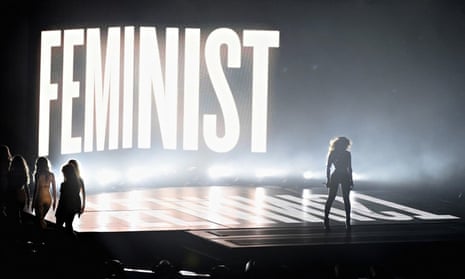Feminists are everywhere these days. Beyoncé performed in front of the f-word in towering lights, feminism is being celebrated on magazine covers the world over, and every young female celebrity gets put through the “are you or aren’t you” feminist bona fides test.
In some ways, feminism’s current popularity is a dream come true: Feminists, myself included, have been working for a long time to convince people – younger women, especially – that they are, in fact, feminists. Believe in gender equality? we asked. Congratulations, you’re a feminist!
But in our haste to convince the world that feminism is a simple, shared value, it may be that we didn’t draw clear enough boundaries. Because if everyone is a feminist, is anyone?
Along with the broader goal of gender justice – whether reproductive rights, economic justice or ending sexual violence – the last 15 years of feminist work has also largely been focused on making a long-maligned movement more accessible. Magazines like Bitch and BUST made feminism part of the pop culture conversation, blogs democratized (to some extent) who got to be an “expert” on the issue, and theorists worked to ensure that their work wasn’t just for the elite.
For example, one of the reasons that bell hooks penned her book, Feminism is for Everybody, was because of her experience meeting people who thought feminists were “evil” man-haters. The venerated professor and author wrote:
When I ask these same folks about the feminist books or magazines they read, when I ask about the feminist talks they have heard, about the feminist activists I know, they respond by letting me know that everything they know about feminism has come into their lives thirdhand, that they really have not come close enough to the feminist movement to know what really happens, what it’s really about.
Only 14 years later, it’s hard to imagine a person whose information about feminism comes third-hand. Feminists are everywhere – in Angela Davis quotes reblogged on teenage Tumblrs, behind Democratic campaign strategy and dominating pop culture. According to Google trends, people searched for information on the definition of feminism in 2014 at five times the rate they did in 2013.
But because of the confusion around what a feminist is, people who would normally and understandably be seen as foes of feminism are calling themselves and being accepted as feminists. For instance, Christina Hoff Sommers, who has found her calling in defending GamerGate misogynists, calls herself the “factual feminist”; Julie Bindel, who recently claimed that feminists focus too much on “the vilification of individuals”, has no problem suggesting that feminists need to oppose the very existence of trans individuals; and even Sarah Palin, who would deny women reproductive rights and cut funding to a shelter for teen moms, laid claim to the word “feminist”.
Sarah Palin is hardly the first woman to both express decidedly anti-woman views and call herself a feminist. Mainstream feminism itself has a storied history (and present, unfortunately) of homophobia, transphobia and racism that has long complicated what being a “feminist” really means.
Ronnee Schreiber, author of Righting Feminism: Conservative Women and American Politics, told me, “It’s important for feminists to be able to say someone’s actions are not feminist or the term loses all meaning and no one knows what it stands for.”
Eesha Pandit, a writer with the Crunk Feminist Collective, told me that she believes this is an important moment for feminism to engage the people who identify as feminists without the movement having to be “co-opted and lose all meaning”. She added that any “feminism that doesn’t include a race, class, gender, power and privilege analysis is incomplete”.
Rebecca Traister, senior editor at The New Republic, explained to me that determining who is and is not a feminist is nearly impossible.
There’s no keeping people out of it, or moving people in, because there’s no controlling body and there’s no controlling definition. It’s always been a term used to describe what has always been a contentious and cacophonous movement – which has also had intense internal differences.
And Anna Holmes, the founding editor of Jezebel.com and editor of Digital Voices at Fusion, points out that identifying as a feminist didn’t ever necessarily mean you were doing something within feminism. “I think you can move about the world as a feminist, and interpret and shape the world around you as a feminist, without having to, say, go to statehouses or volunteer at Planned Parenthood,” Holmes told me.
It’s true: feminist can be a label, a practice and a lens by which we view the world.
But maybe doing the work of feminism is more important than identifying as a feminist. After all, word isn’t just an identity – it’s a movement. It’s something that you do.
Without some boundaries for claiming the word feminist, it becomes meaningless. So once and for all: Can you be an anti-choice feminist? No. A Republican feminist? Unlikely. A feminist who thinks that the issues of importance to women of color or gay women or trans women or disabled women aren’t “feminist issues”? To quote Flavia Dzodan, “My feminism will be intersectional, or it will be bullshit” – and I’m not interested in bullshit.
Feminism is a movement for gender justice – for social, political and economic equality of all women – and one that recognizes the complexity of women’s identities and the intersection of oppressions. It can’t be negotiated otherwise.
I am thrilled that more people are thinking about, looking into, and calling themselves feminists. That is a good place to start. But the ubiquity of the word in popular culture, all the people identifying as feminist – that doesn’t guarantee progress on the ground.
A word doesn’t will a movement into being. Action does.

